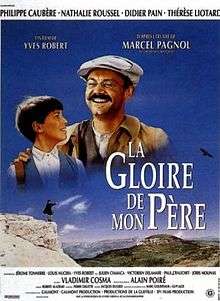My Father's Glory (film)
| My Father's Glory | |
|---|---|
 French poster for the film | |
| Directed by | Yves Robert |
| Produced by | Alain Poiré |
| Written by |
|
| Starring |
|
| Narrated by | Jean-Pierre Darras |
| Music by | Vladimir Cosma |
| Edited by | Pierre Gillette |
Release dates |
|
| Country | France |
| Language | French |
| Box office | $53.5 million |
My Father's Glory (original title: La Gloire de mon père) is a 1990 French film directed by Yves Robert, based on the novel My Father's Glory by Marcel Pagnol. The sequel, which was also filmed by Robert in 1990, is My Mother's Castle (French: Le Château de ma mère). Both films are known by their original, French-language titles outside the United States.
Plot
This film is set in the period between 1900 and the First World War in 1914. Young Marcel was born in the country but raised in Marseilles. His father, Joseph, is a hard-working strongly atheist public school teacher in Marseilles. Marcel's Aunt Rose marries the round, jovial, and very theistic and Roman Catholic Uncle Jules. Joseph and Uncle Jules come into conflict over religion.
Over summer break, Joseph and Jules decide to take their respective families to a house in the country. Here, Jules decides to educate Joseph on hunting. Marcel wants to come hunting with them, but the two adults lie to him and leave the house while he is still just waking up. He follows them stealthily and is angered by the way Jules makes a fool of Joseph with his hunting prowess. Marcel is lost in the wilderness when he meets a boy called Lili, who tells him where the hunting party is. Joseph takes potshots at two rock partridges and they fall to ground beside Marcel. He watches as Jules reprimands Joseph for shooting at and missing the birds. At this point, Marcel reveals himself and the partridges.
Later, Lili, who knows everything about the countryside, becomes Marcel's friend and teaches him about the ways of the countryside. They regularly go exploring in the countryside of Provence, in southern France.
As the holiday comes to an end, Marcel plans with Lili to hide himself in a cave, and live there as a hermit, in order to continue living in Provence, which he has grown very fond of. On the day of their departure, Marcel gets up early in the morning. He has written a letter for this purpose earlier, explaining his disappearance to his parents, and excusing his behaviour. He warns them that they will not be able to find him in his "new home," and should not bother searching. He then walks to the cave with Lili, who was waiting for him near his house. As they arrive, Marcel begins to become afraid of living alone. He invents all kinds of excuses to avoid living in the cave. He then runs home quickly to prevent his parents reading the letter, which he had placed on his pillow. As he returns home, everyone is already busy loading up a carriage for the journey home. He runs up to his room, and discovers that the letter is still on his pillow, and he assumes that no one has read it. As he gets ready to leave the house for a last time, his parents make a remark which indicates that they in fact did read the letter. The film ends with Marcel and his family departing in a coach, and Lili looking on.
Cast and roles
- Philippe Caubère - Joseph Pagnol
- Nathalie Roussel - Augustine
- Didier Pain - Oncle Jules
- Thérèse Liotard - Tante Rose
- Julien Ciamaca - Marcel 11 years old
- Victorien Delamare - Paul
- Joris Molinas - Lili des Bellons
- Benoît Martin - Marcel petit
- Paul Crauchet - Mond des Parpaillouns
- Pierre Maguelon - François
- Michel Modo - le facteur
- Jean Rougerie - Bergougnas, le brocanteur
- Jean-Pierre Darras - Narrator (voice of Marcel)
- Victor Garrivier - le curé de la Treille
- Raoul Curet - Monsieur Vincent
- Andrée Damant - A woman